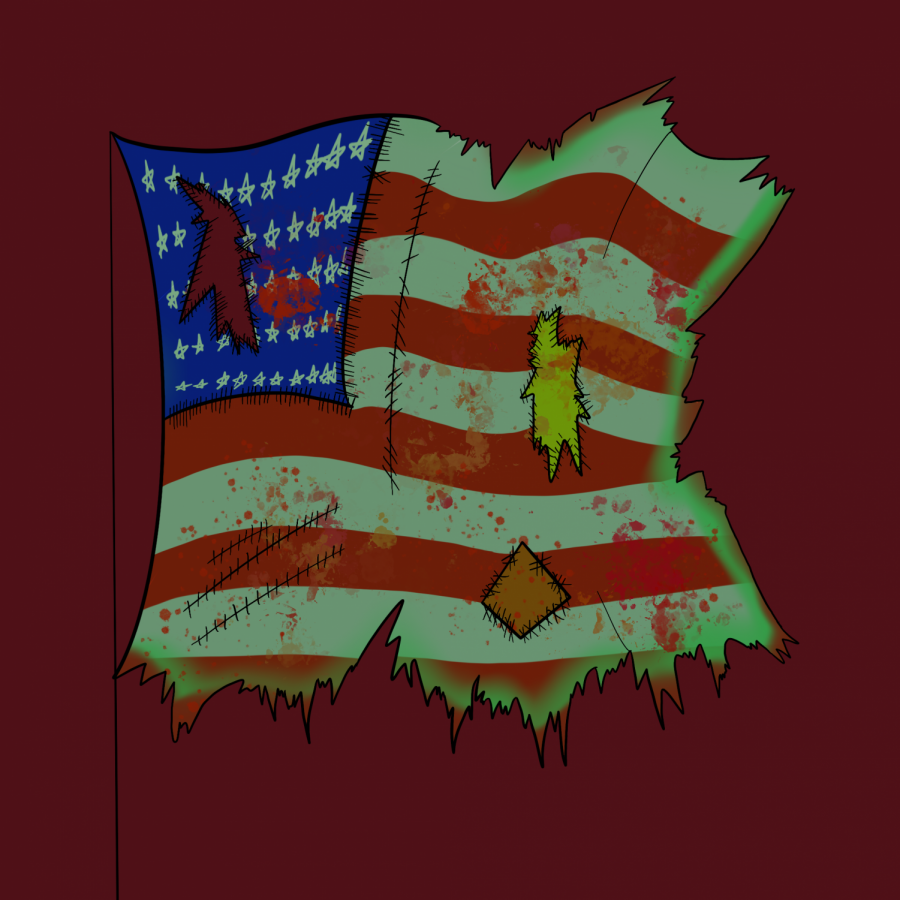Students debate patriotism in wake of the “Star Spangled Banner Act”
With the introduction of the “Star Spangled Banner Act,” controversy surrounding sitting or standing for the flag is in full effect in schools across the state. On April 21, 2021, Arkansas Representative Mark Berry wrote and proposed the House Bill 1831. This bill quickly passed and requires the National Anthem to be played in k-12 classrooms at least once a week and at all sporting events in public schools, colleges, and universities.
“He [Representative Berry] said he really wanted to promote patriotic education,” Arkansas Representative Megan Godfrey said, “because many may not feel patriotic or know a lot of the kind of the history and tradition of America that inspires patriotism.”
According to Godfrey, though, this bill isn’t the best way in achieving that purpose.
“I asked him if he thought it would be better to not just mandate the playing of the National Anthem, but to integrate National Anthem standards into the curriculum,” Godfrey said. “It could have been embeded into history curriculum standards, into music education curriculum standards, or others.”
Despite her suggestions, Rep. Godfrey was the only member of the House to vote against this bill.
“I did end up voting no against the bill,” Godfrey said. “I just think there are more thoughtful, and better, more effective ways to promote patriotism and patriotic education”.
This single vote against it has led Godfrey to receive pushback from members in the Arkansas House of Representatives with some attacking her patriotism as an American.
“I don’t think it’s unpatriotic to say, ‘I want to constantly make America better. I love our country enough to not be afraid to make changes,’”Godfrey said. “I think that’s my definition of patriotism that I see so much good in this country and so much potential for community and collaboration.”
In contrast, junior Carson Butler did not share these same sentiments.
“I feel that they should have the opportunity to go and live somewhere else and see how other countries have their day to day lives compared to us, and realize what we have is very fortunate,” Butler said.
Butler strongly believes that sitting during the National Anthem dishonors veterans.
“When it comes to me, it makes me mad. Today we have to respect people that fought for our freedom by taking a minute or two out of our day,” Butler said. “It’s not too much to ask.”
According to a poll sent to the student body, of the 152 responses, 80% said they stand during the National Anthem while 20% said they did not stand. On average, 1 out of every 5 students does not stand up for the National Anthem and reason varied.
“My uncle was in the seal team at 6, extortion at 17, and died in action to save this country. Those who sit down during the National Anthem or Pledge of Allegiance are very disrespectful and ignorant to those who have died for our freedom,” one student claims. “The least somebody could do would be to stand up in front of a flag to show their respects.”
Another student, who also claimed they stood, offered up a different reason for doing so.
“I stand because I want to stand and honor all the lives lost in America due to violence, such as racism, homophobia, gun violence, etc,” this student writes.
This argument, though, was used again and again throughout this poll, but not in favor of standing. One student agreed that there was violence and racism in America, but they used that as the reason they sat.
“I do not believe that in today’s America, the government follows the principles that are said during the pledge. ‘Liberty and justice for all,’” this student said. “It feels as if though the anthem is a song for non-POC, cis, heterosexual Americans. Not to mention, the extent that colonizers went in order to take over the country; to create a song about ‘gaining freedom.’ It rubs me off the wrong way.”
Another student gave credence to the origins of the National Anthem and used it as reasoning to sit down.
“The National Anthem was written by Francis Scott Key,” this student said. “He owned black people. He was responsible for killing black people and dehumanizing them.
This credence may have been the education Representative Godfrey spoke about as it is a historically accurate claim surrounding the origins of the national anthem.
Senior Hallie Kirk has strong feelings towards this matter. Kirk feels this behavior from our state government modeled that of indoctrination.
“I feel like it’s being shoved down our throats and is trying to indoctrinate kids who have their own opinions,” Kirk said. “I think it’s worth it to hear those kids out instead of trying to make them feel a certain way.”
On the other hand, Kirk is frustrated with those who deem “National Anthem sitters” unpatriotic. She, instead, believes it’s the exact opposite.
“Sitting during the National Anthem, in my opinion, is just another way of expressing patriotism,” Kirk said. “Not everything in our country is going to be perfect and calling it out is another way of showing your love for it and wanting to improve it.”
While Kirk doesn’t necessarily see the need for more patriotism to be included in our curriculum, like Representative Godfrey, she does acknowledge the shared attitudes that criticize America.
“Here’s the thing. I think for too long we have shielded kids from the truth behind our country,” Kirk said. “Even though it may hurt our perception of America, students have the right to know it just like the ridiculous amount of good things we’ve done. You can’t improve yourself by believing you’re incapable of making mistakes.”
